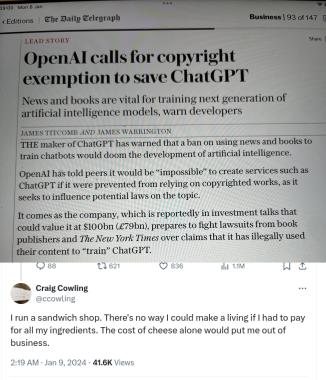The Irony of 'You Wouldn't Download a Car' Making a Comeback in AI Debates
Those claiming AI training on copyrighted works is “theft” misunderstand key aspects of copyright law and AI technology. Copyright protects specific expressions of ideas, not the ideas themselves. When AI systems ingest copyrighted works, they’re extracting general patterns and concepts - the “Bob Dylan-ness” or “Hemingway-ness” - not copying specific text or images.
This process is akin to how humans learn by reading widely and absorbing styles and techniques, rather than memorizing and reproducing exact passages. The AI discards the original text, keeping only abstract representations in “vector space”. When generating new content, the AI isn’t recreating copyrighted works, but producing new expressions inspired by the concepts it’s learned.
This is fundamentally different from copying a book or song. It’s more like the long-standing artistic tradition of being influenced by others’ work. The law has always recognized that ideas themselves can’t be owned - only particular expressions of them.
Moreover, there’s precedent for this kind of use being considered “transformative” and thus fair use. The Google Books project, which scanned millions of books to create a searchable index, was ruled legal despite protests from authors and publishers. AI training is arguably even more transformative.
While it’s understandable that creators feel uneasy about this new technology, labeling it “theft” is both legally and technically inaccurate. We may need new ways to support and compensate creators in the AI age, but that doesn’t make the current use of copyrighted works for AI training illegal or unethical.
For those interested, this argument is nicely laid out by Damien Riehl in FLOSS Weekly episode 744. twit.tv/shows/floss-weekly/episodes/744
